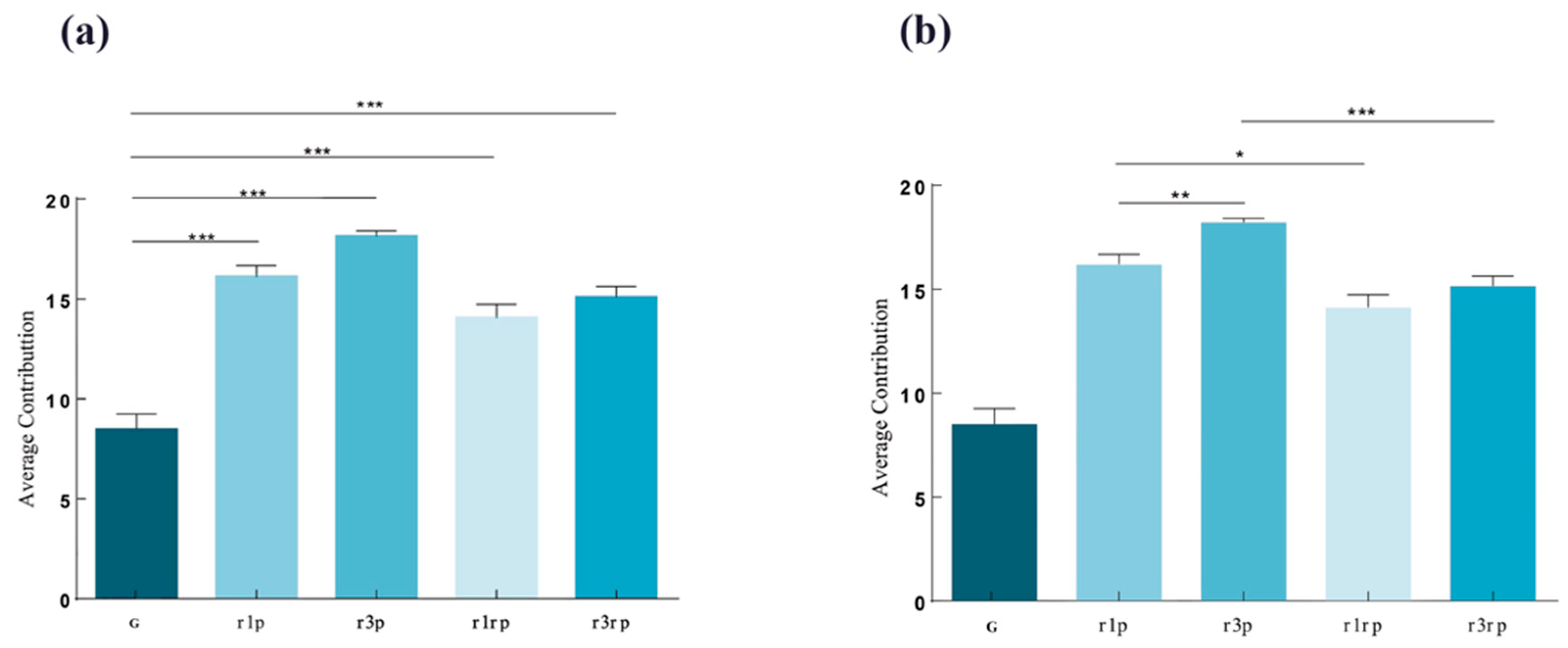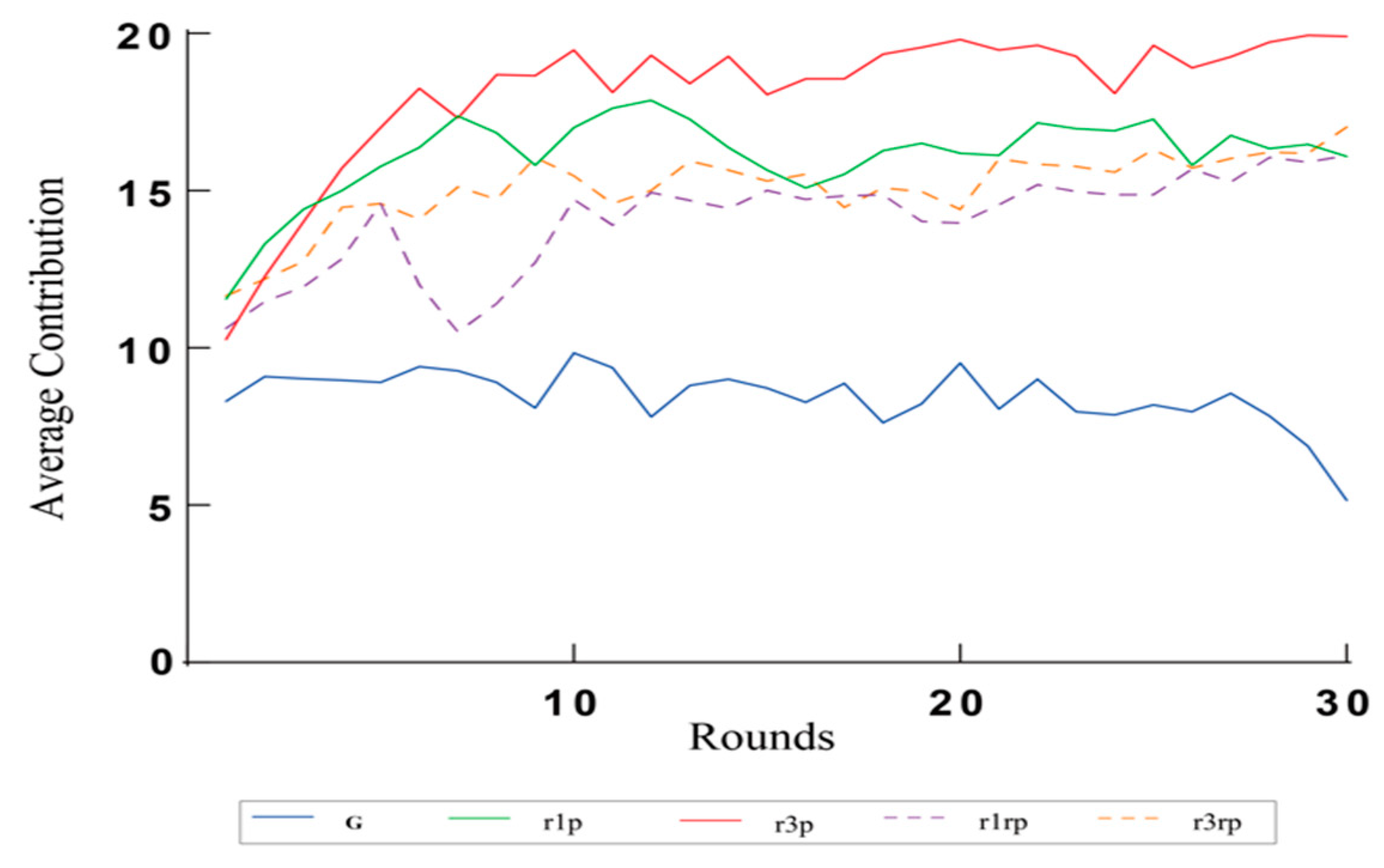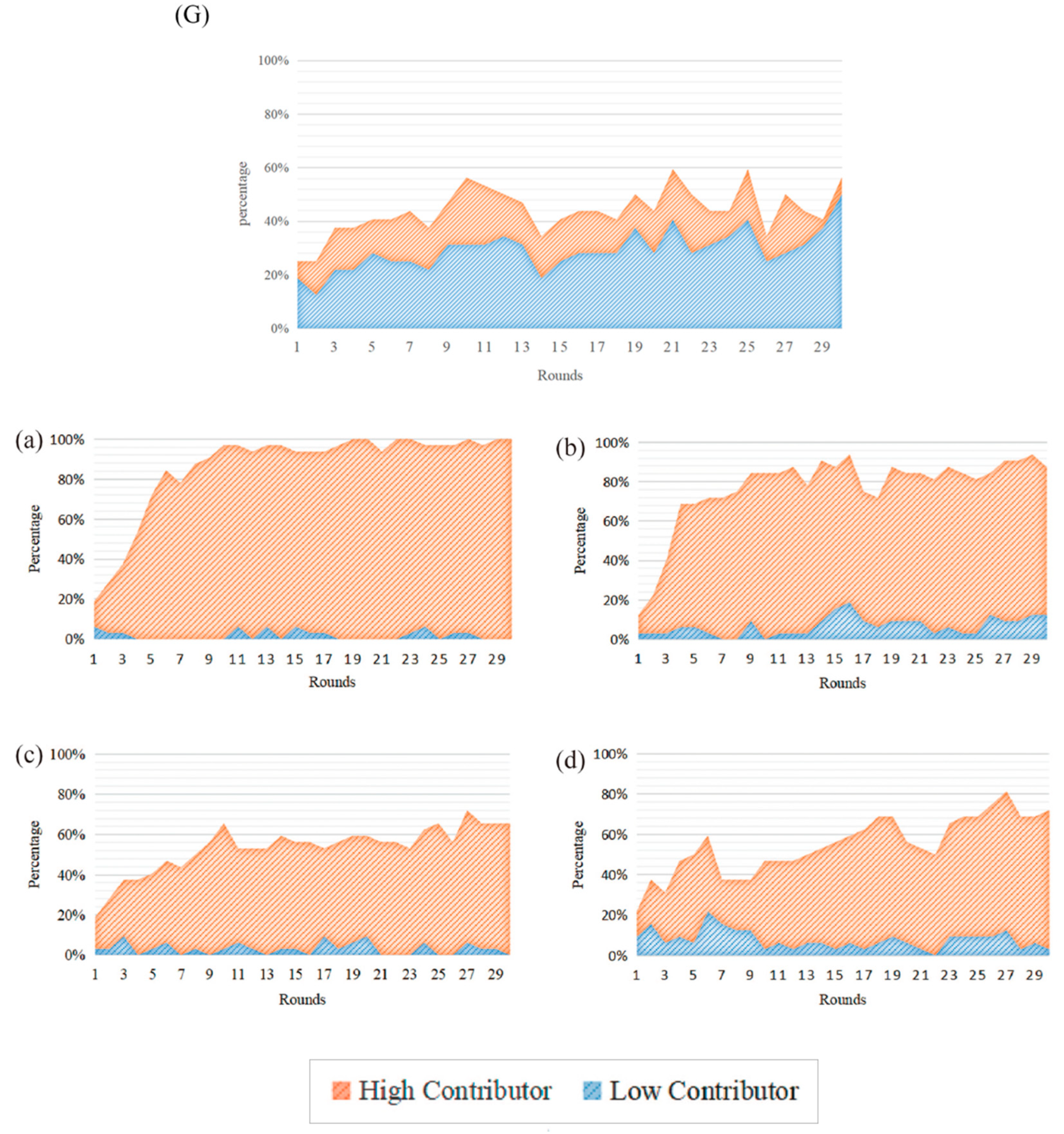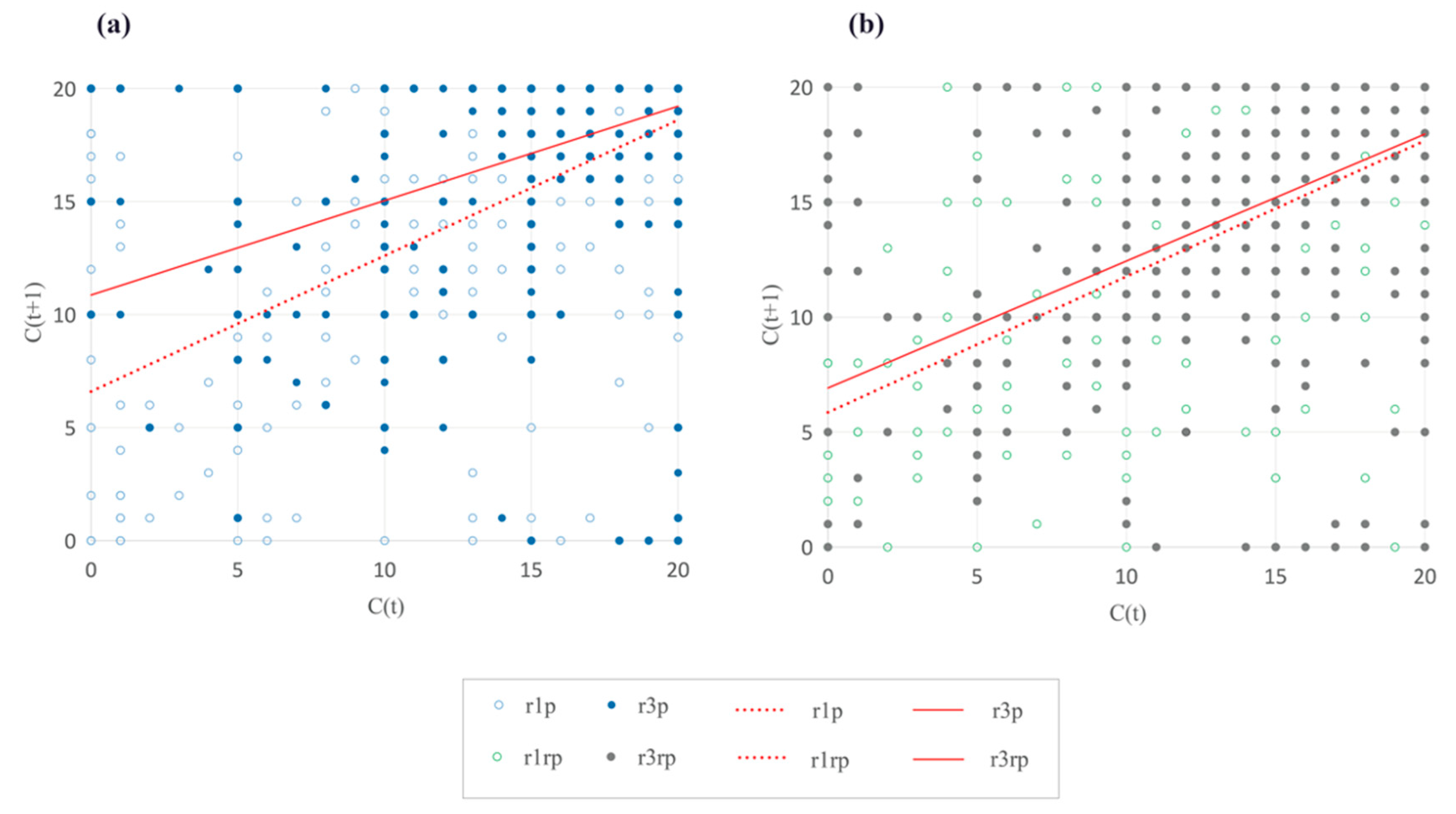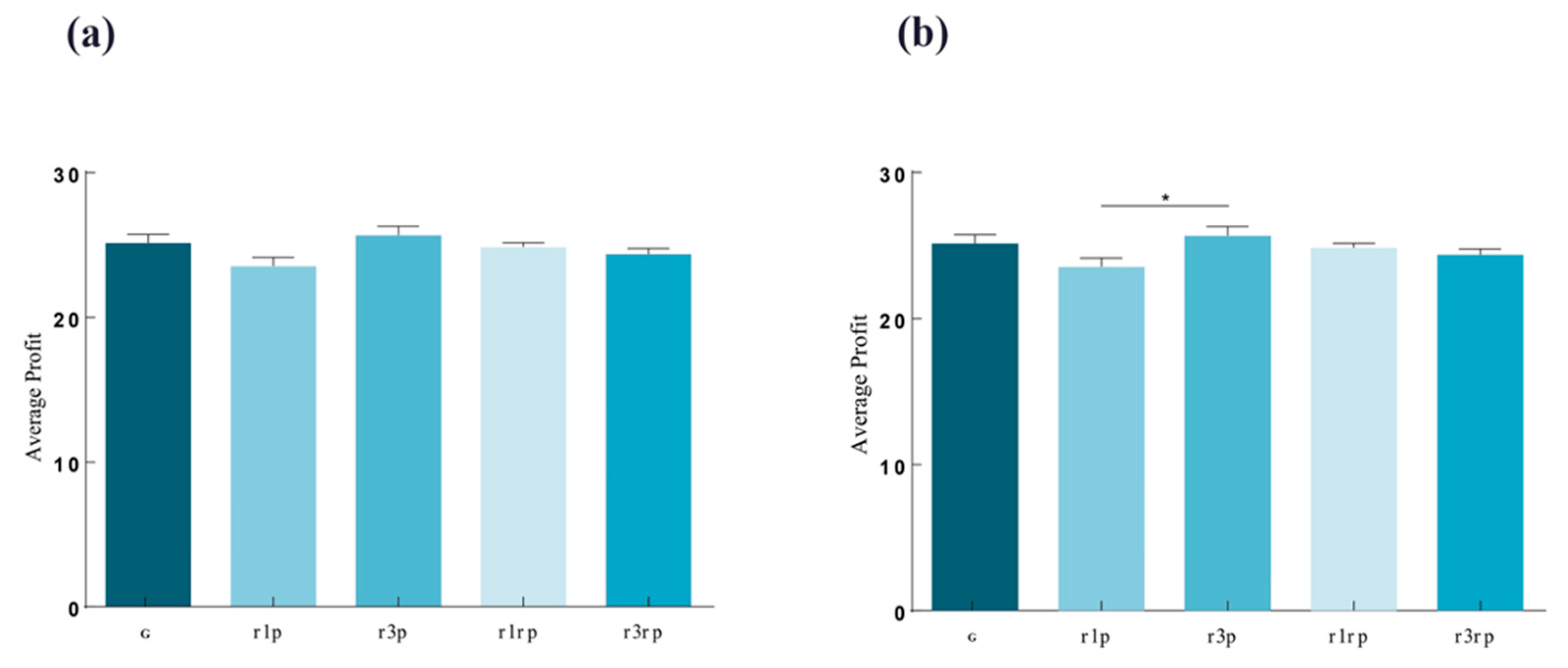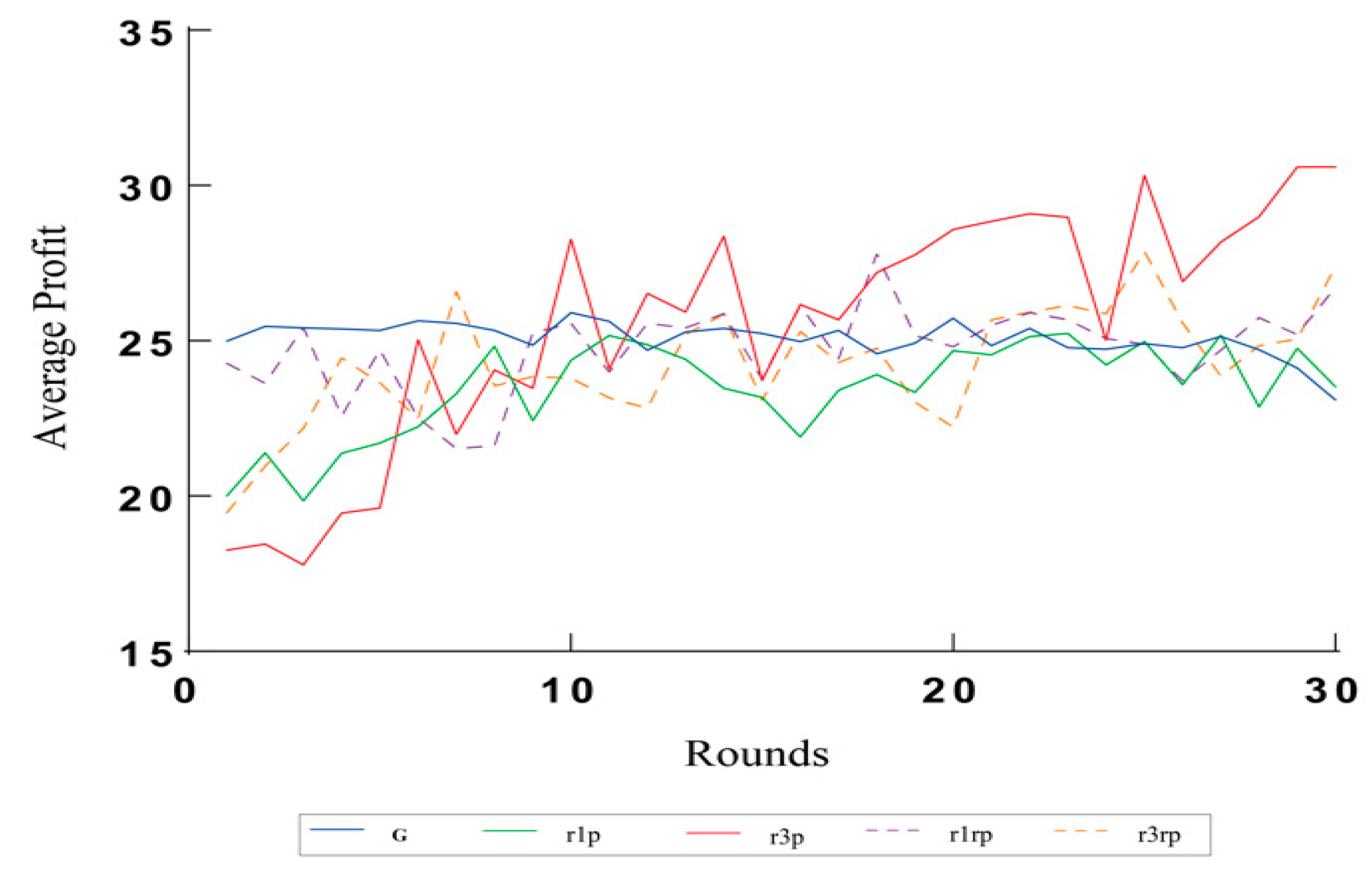1. Introduction
In real-world settings, the distinction between cooperation and free riding is a dynamic and complex aspect of social relationships. In many social situations, individuals choose whether to cooperate with others for mutual benefit or to engage in free-riding behavior, taking advantage of the efforts of others without contributing proportionally. The connection between inhibiting free-riding behavior, fostering cooperation, and human reproduction is an interesting perspective within the framework of evolutionary psychology and social evolution [
1,
2,
3,
4,
5,
6,
7]. Voluntary cooperative behaviors exist in related and unrelated groups but also among people who interact only once with each other [
8,
9].
Based on its importance, cooperative behavior has received extensive attention from different disciplines and scientists put forward various theoretical hypotheses and effects, such as kin selection theory [
10], reciprocal altruism theory [
11], indirect reciprocity theory[
12], and cost signal theory [
13]. Interestingly, the evolution of human cooperative behavior has been accompanied by free riding, as opposed to cooperative behavior, which benefits from cooperation but does not contribute. To guarantee cooperative behavior, human society produces different types of sanction mechanisms such as decentralized sanction mechanisms and centralized sanction mechanisms. No matter what kind of sanction mechanism people use, peer punishment is one of the most common incentives [
14]. Various studies conducted through different approaches and disciplines have produced inconsistent findings regarding the effectiveness of peer punishment in promoting cooperation [
15,
16,
17,
18,
19].
Several studies on punishment proved that both peer punishment and centralized punishment can effectively inhibit free-riding behavior significantly promote cooperation[
8,
20,
21,
22,
23,
24,
25], and even maintain a high level of cooperation at a small cost [
1,
12,
26]. The application of computer simulation technology has shown that punishment promotes cooperation in small and big groups. A study conducted by Boyd et al. [
1] used computer simulation technology to analyze the frequency of long-term evolution. The study incorporated factors such as imitation and migration in the pattern to make it more realistic to the real human social evolution process. Scholars found that punishment promotes cooperation in larger settings, and the level of cooperation is directly related to the cost of punishment. Additionally, they observed that compared to fixed punishment, people are more willing to pay variable costs. Moreover, computer simulation modeling was used by other researchers to study peer punishment, pool punishment, and institutional punishment [
27,
28].
In recent years, researchers have conducted studies using public goods games that offer optional choices, to examine how various forms of punishment affect cooperative behavior. The findings suggest that when second-order punishment is not present, peer punishment is more effective than overall punishment. However, when second-order punishment is present, overall punishment outperforms peer punishment [
29]. According to researchers who analyze institutional punishment, institutions tend to use high costs as a way to deter free riders. However, optimal mechanisms would allow institutions to punish free riders at lower costs, thereby achieving the goals of larger-scale stable cooperation and regime consolidation [
30].
In light of this, studies have confirmed that the above measures inhibited free riding to some extent and promoted cooperation among groups. While some scientists believe that second-party sanctions are more effective in promoting public cooperation and are more in line with real-world interactions, others argue that third-party sanctions can have a more significant impact on promoting cooperation and maintaining long-term cooperation. It is worth noting that both second-party and third-party sanctions have their advantages and disadvantages, and the effectiveness of each type of sanction may vary depending on the specific context and conditions [
15,
16,
18,
31], other studies have suggested that second sanctions are costly, causing a second-order free-rider problem. However, third sanctions may overcome these defects and achieve higher efficiency [
20,
29].
In comparison to second-party sanctions, third-party sanctions not only have a fundamental role in social structure but also serve as an important model for social stability and governance. Conducting an empirical study on free riding in the laboratory using the behavioral economics paradigm is a good approach from a methodological perspective. This approach simulates the process of social norms generation and explains the mechanism of human cooperation and decision-making to a certain extent [
32,
33].
Studies have shown that punishment can be used to improve cooperation. However, there is no consensus on the specific roles that punishment plays in this process, and the effects of such measures on cooperative behavior and the underlying mechanisms remain unclear. This is largely because most research has either concentrated on one or the other or has only looked at punishment in the context of a second-party sanction mechanism. There have been very few studies that investigated punishment within the framework of a centralized sanctions mechanism [
32,
34].
Torsten Decker et al. [
35] proposed that different patterns of punishment rules, intensity, peer punishment, and centralized sanctions are all factors that affect the level of cooperation. Enrique Fatas et al. [
36] also argued that although random sanction mechanisms cannot eliminate the downward trend of cooperation level, they still raise the level of cooperation behaviors, and Skinner’s [
37] reinforcement theory proposed, that if the theory that interval reinforcement can maintain higher response rates and lower regression rates than continuous reinforcement holds, then in centralized sanctions mechanisms, the intensity and randomness are critical factors affecting the effectiveness of punishment.
Based on the above-cited studies, we propose the following hypotheses 1 and 2:
H1. In centralized sanctions mechanisms, various patterns of third-party punishment have an unbalanced impact on cooperation levels.
H2. People's level of cooperation varies depending on whether they are subjected to high-intensity or low-intensity punishment. Non-random punishment and random punishment have distinct impacts on cooperative behavior levels.
Research by Baldassarria & Grossman [
38] finds that third-party punishment not only effectively promotes the improvement of cooperation levels, but also as a centralized sanction mechanism promotes the effectiveness of punishment. Gao et al. [
39] conducted a study on punishment in centralized sanctions mechanisms. They found that punishment is more effective in promoting cooperation and can maintain long-term stable cooperation levels. In addition, subjects’ reactions to punishment also vary. Therefore, we put forward the hypothesis 3:
H3. Third-party punishments can successfully reduce free-riding behavior, with an asymmetrical effect across different patterns.
This paper aims to look into broad patterns of human behavior using punishment mechanisms in centralized sanctions. Investigating the impact of punishment on free riding through an ecological perspective, we believe that various factors, such as the frequency, intensity, and randomness of punishments, as well as psychological factors, may influence behavior. In real life, punishments are not always foreseeable and can occur at random [
36]. Consequently, we intend to investigate the relationship between randomness and punishment intensity, as well as examine techniques for reducing free riders and promoting cooperation.
2. Research Framework
The research aimed to study the effects of punishment within the framework of centralized sanctions. Based on previous literature and simulations of real-life scenarios, we conducted a study to examine the effects of different structures of third-party punishment on cooperation and profit levels, as well as people's behavior configurations. To do so, we classified punishment into four distinct patterns and examined two factors: intensity and randomness.
This study fills a theoretical gap in previous research by conducting an in-depth study on how punishment works in the centralized sanctions mechanism. It also makes theoretical contributions to what function this mechanism has at the micro-individual level and how much it influences public cooperation.
2.1. Method
The study utilizes a repeated public goods game as a fundamental experimental framework. The study examines the impact of third-party punishment on public cooperation. Specifically, we investigate five different treatment groups, which include the control group, low punishment group, high punishment group, low random punishment group, and high random punishment group. We aim to investigate and compare the levels of cooperation, profit, and cooperative behavior across the different groups. Additionally, we establish a multiple linear regression model to analyze the mechanism behind cooperative behavior.
2.2. Subjects and Treatment Groups
Our behavioral experiment was conducted at the Zhejiang Sci-Tech University between October 2022 and May 2023. A total of 160 undergraduate and graduate students (consisting of 83 males and 77 females) from the university, aged between 17 to 26, took part in the experiment. None of the participants had taken part in a public goods experiment before. The subjects were randomly assigned to different treatment groups, and each subject took part in only one experimental treatment.
There are 5 treatment groups in the experiment. These groups include the control group (G), low-intensity punishment group (r1p), high-intensity punishment group (r3p), low random punishment group (r1rp), and high random punishment group (r3rp). Each treatment group consists of 8 groups and each group has 4 subjects, making the total number of subjects 32.
2.3. Experimental Design
This experiment was conducted in the psychology laboratory of the university, using the z-Tree platform to edit and run the experimental program [
40]. The software package was developed by the Department of Economics at the University of Zurich in Switzerland, and this experiment has been authorized by the other party. The authorization letter can be found in
Appendix A.
The experiment consists of 5 computers placed in 5 separate rooms, with 1 being the main operating host (experimenter) and the remaining 4 being the terminals used by the subjects. Both the G group and the experimental groups took part in 30 series of the experiment. In the G group, each participant was given 20 initial tokens at the beginning of each sequence. They were then given the option to invest their tokens in the public account(
). The investment amount could be any integer between 0 and 20. After each subject made their investment decision, the number of tokens in the public account was multiplied by 1.6 times. The tokens were then divided equally among all the subjects, while the remaining ones (tokens) belonged to the individual subjects. The profits of each subject in each round (
)were the tokens left after they invested in the public account and the public advantages or benefits generated by the public account. At the end of the initial level, every individual's temporary profit is equivalent to
Where is the contribution of the player , is the contribution of the player .
Before starting the next round (phase two), participants will be given feedback on the following information: (a) the number of tokens contributed by the subjects in the previous round. (b) the total number of tokens invested by the group in the previous round. (c) the profit earned (payoff) by the subjects in that stage. In the first stage, after the subjects had inserted their tokens, each of them received a payoff as per (1). They then proceeded to the second stage, the punishment stage. In the r1p and r3r groups, the punishment was given at every stage, while in the r1rp and the r3rp groups, the punishment occurred randomly.
For this experiment, third-party punishments were automatically generated by a program using pre-written algorithms, without any involvement of human factors. The program designed by z-Tree first selected the subjects whose contribution (
) was less than the average contribution (
) of their group in a given stage, then the program punished subjects who met the condition:
. The punishment will be calculated as the difference between the average contribution of the group (
) and the contribution of the subjects in that stage (
) multiplied by a coefficient (
). The final payoff of the subject was determined by subtracting the punishment from the first stage's payoff.
Where
is the payoff in each phase or period.
The subject either received no punishment (0) or was punished (1). The punishment treatment groups were divided into low-punishment and high-punishment groups based on the coefficient (r) equal to 1 or 3. Additionally, the punishment treatment groups were categorized into punishment groups and random punishment groups based on whether the punishment appeared randomly or not.
Appendix B,
Appendix C and
Appendix D contains extensive experimental procedures and instructions.
2.4. Procedure
Upon arrival at the laboratory, the primary experimenter will inform the participants that the experiment will not have any physiological or psychological impact. They will also answer any questions that the subjects may have. Once the participants' issues are addressed, they will be asked to sign the "Subject Informed Consent Form," confirming their agreement to participate.
The participants of the experiment will be assigned to separate and isolated rooms where they will remain anonymous and won't be able to communicate with or see each other. The experiment will be conducted entirely on a computer program, including the instructions section and the formal experiment. The participants were instructed to use the computer to complete two calculation questions that were related to the experiment. If the participants have any problems during this period, they can ask the experimenter. The experimenter answered the questions or problems and ensured that each participant fully understood the experimental rules before proceeding to the formal experimental stage.
In this experiment, each participant is assigned to only one treatment group, and the design is participant-to-participant. The experiment lasts for approximately 30 minutes, after which the subjects will complete a questionnaire on the computer. The questionnaire will include questions about basic information, reasons behind their decision-making, and their thoughts on the experiment. Upon completion of the experiment, the experimenter will distribute fees to the subjects following the experimental outcomes. The G group participants earned an average of RMB 25.07, while those in the 4 punishment treatment groups earned an average of RMB 24.53.
5. Results
We conducted multiple linear regression analysis based on the data collected from round 2 to round 30 to analyze the effect of various factors on the level of cooperation. The dependent variable was the contribution of each round, and we considered six independent variables in the punishment treatment groups. These variables included the number of rounds, previous round contribution, previous round profit, previous round punishment, intensity, and randomness. Intensity and randomness were the two dummy variables, as shown in
Table 5.
The model of punishment groups demonstrates that several factors have a significant impact on the contribution level, including the contribution, profit, and punishment of the previous round, as well as intensity and randomness. Notably, non-random punishment may improve the contribution level, as randomness has a negative effect. Meanwhile, the contribution, profit, punishment, and intensity of the previous round all positively impact the contribution level of the current phase. Additionally, the number of rounds has a slight positive effect on the contribution level, indicating an upward trend in cooperation over time.
By comparing the coefficients, it can be found that the subjects in the punishment group who contributed more in the previous round are more likely to make high-level contributions in this round.
High-intensity and non-random punishments can be more effective in improving cooperation, especially in third-party punishment mechanisms. Punishment in the previous round can significantly increase the contribution level in the next stage. This is consistent with the results of the public goods experiment, which showed that the roles of punishment in third-party sanction mechanisms are significantly different.
7. Conclusions
This study examined the impact of punishments in centralized sanction mechanisms by incorporating third-party punishment into the standard public goods experimental paradigm.
Our findings are threefold. Firstly, punishment achieves higher cooperation at a lower cost. Non-random and high-intensity punishment can maintain long-term and high-level cooperation under sufficient information. Secondly, punishment effectively inhibits free-riding behavior when there is sufficient information. Punishment intensity drives cooperation and inhibits free-riding behavior. Finally, in punishment schemes, people's behaviors remain consistent through high-intensity and non-random punishment mechanisms. This leads to the establishment of cooperative social norms, which help prevent punishment and eventually lead to increased profits.
In summary, these findings support (H1), (H2), and (H3), indicating that sanction systems play an asymmetric role in punishment.
The study was conducted in a controlled laboratory setting at Zhejiang Sci-Tech University; therefore, the results may not accurately reflect real-world situations due to the unlimited and unavailable information. Consequently, it is worthwhile to investigate how to conduct experimental research on the centralized sanction mechanism in such scenarios with a more ecological approach. Additionally, research could be replicated in different cultural contexts to validate the findings and look into cultural influences on the efficiency of punishment. Lastly, reward can be seen as another incentive mechanism that can be used as a supplement to this study to understand better the mechanisms that enable cooperative behavior and the effectiveness of centralized punishment in a number of settings.
Appendix A. z-Tree Software Authorization Form (without Username and Password)
Dear z-Tree user,
Thank you for sending the license contract. You can download this version from
http://www.econ.uzh.ch/ztree/downloads.html. Your username is ZXXXXX and your password is XXXXXXXX. You will need this username and password to download future releases of z-Tree. Make sure that your browser accepts cookies from our domain uzh.ch.
When you log in, you can change your password and your profile, which includes your email address. It would be nice if you would also enter the geographical coordinates of your location in your profile. We could then present a world map of z-Tree on our web page. Please do not forget to mention in your paper that you used z-Tree. The correct citation is: The experiment was programmed and conducted with the experiment software z-Tree (Fischbacher, 2007).
Reference: Fischbacher, U. (2007): z-Tree: Zurich Toolbox for Ready-made Economic Experiments. Experimental Economics, 10(2), 171-178.
The manual and other information on support can be found on our website.
You will also find references to experimental papers that used z-Tree. For some of them, you can download the treatment (i.e. the program). This list is open. If you have a publication or a working paper on an experiment conducted with z-Tree, you can contribute it to this list.
Regards,
Urs Fischbacher
Appendix B. The Control (G) Group Instructions and Experimental
This is a decision-making experiment, please read the instructions carefully as your decision will determine the profit for you and the other team members.
This experiment consists of several rounds in which you and three other team members form a temporary team during the game. Each team member will be given 20 tokens as capital in each round, which will be converted into actual profit in a specific ratio at the end of the experiment. You need to decide how many tokens Xn to put into the public account each round (0 ≤ Xn ≤ 20, Xn is an integer). The tokens you gain at the end of each round consist of two parts:
Tokens are not put into the public account each round, which is (20 − Xn).
The total number of tokens put into the public account by all team members is multiplied by 1.6 and shared, resulting in 1.6 × (X1 + X2 + X3 + X4) ÷ 4.
The total tokens you gain in each round: (20 − Xn) + 1.6 × (X1 + X2 + X3 + X4) ÷ 4.
Example B1:
1. If all 4 team members contribute 20 tokens to the public account, each member’s profit equals (20 − 20) + 1.6 × (20 + 20 + 20 + 20) ÷ 4 = 32 tokens.
2. If 3 team members give 20 tokens to the public account, and 1 gives 0 tokens, the profit for the team members who give 20 tokens: (20 − 20) + 1.6 × (20 + 20 + 20 + 0) ÷ 4 = 24 tokens.
3. The profit for the team member who gives 0 tokens: (20 − 0) + 1.6 × (20 + 20 + 20 + 0) ÷ 4 = 44 tokens.
The feedback receives after each round:
1. Total tokens are given by your team.
2. Tokens you give.
3. Tokens you gained in this round, then you will move to the next round.
To determine whether you fully understand the above experimental explanation, please complete the two mini-tests below and enter your answers into the computer by selecting "Check Answers":
1. If the other 3 team members give 5, 10, and 15 tokens respectively, and you give 20 tokens (4 people totaling 50 tokens), how many tokens will you receive in this round?
2. If the other 3 team members give 10, 15, and 20 tokens correspondingly, and you give 5 tokens (4 people totaling 50 tokens), how many tokens will you receive in this round? If you have any questions, please contact the experimenter for assistance.
Appendix C. Punishment Group Instructions and Experimental
This is a decision-making experiment, please read the instructions carefully as your decision will determine the profit for you and the other team members.
This experiment consists of several rounds in which you and three other team members form a temporary team during the game. Each team member will be given 20 tokens as capital in each round, which will be converted into actual profit in a specific ratio at the end of the experiment. You need to decide how many tokens Xn to put into the public account each round (0 ≤ Xn ≤ 20, Xn is an integer). The tokens you gain at the end of each round consist of two parts:
1. Tokens are not put into the public account each round, which is (20 − Xn).
2. The total number of tokens put into the public account by all team members is multiplied by 1.6 and shared, resulting in 1.6 × (X1 + X2 + X3 + X4) ÷ 4.
3. The total tokens you gain in each round: (20 − Xn) + 1.6 × (X1 + X2 + X3 + X4) ÷ 4.
Punishment occurs in each round, if the tokens you give are lower than the average tokens given by the team(Xn < Xa), your profit will be deducted by some tokens(Xp). Therefore, your final profit: (20 – Xn) + 1.6 × (X1 + X2 + X3 + X4) ÷ 4 – Xp. If the tokens you give are higher than the average, there is no punishment.
"In each round, if the number of tokens you contribute is less than the average number of tokens contributed by the team (Xn < Xa ), your profit will be reduced by a certain number of tokens (Xp). Therefore, your final profit is calculated as (20 - Xn) + 1.6 * (X1 + X2 + X3 + X4) ÷ 4 – Xp. As a result, if the number of tokens you contribute is higher than the average, there is no punishment."
Example B2:
1. If all 4 team members contribute 20 tokens to the public account, each member’s profit equals (20 − 20) + 1.6 × (20 + 20 + 20 + 20) ÷ 4 = 32 tokens.
2. If 3 team members give 20 tokens to the public account, and 1 gives 0 tokens, the profit for the team members who give 20 tokens:
3. (20 − 20) + 1.6 × (20 + 20 + 20 + 0) ÷ 4 = 24 tokens.
4. The profit for the team member who gives 0 tokens: (20 − 0) + 1.6 × (20 + 20 + 20 + 0) ÷ 4 = 44 tokens.
The feedback receives after each round:
1. Total tokens are given by your team.
2. Tokens you give.
3. Whether you are punished.
4. Tokens you gained in this round, then you will move to the next round.
To determine whether you fully understand the above experimental explanation, please complete the two mini-tests below and enter your answers into the computer by selecting "Check Answers":
1. If the other 3 team members give 5, 10, and 15 tokens respectively, and you give 20 tokens (4 people totaling 50 tokens), how many tokens will you receive in this round?
2. If the other 3 team members give 10, 15, and 20 tokens respectively, and you give 5 tokens (4 people totaling 50 tokens), how many tokens will you receive in this round?
If you have any questions, please contact the experimenter for assistance.
Appendix D. Random Punishment Group Instructions and Experimental
This is a decision-making experiment, please read the instructions carefully as your decision will determine the profit for you and the other team members.
This experiment consists of several rounds in which you and three other team members form a temporary team during the game. Each team member will be given 20 tokens as capital in each round, which will be converted into actual profit in a specific ratio at the end of the experiment. You need to decide how many tokens Xn to put into the public account each round (0 ≤ Xn ≤ 20, Xn is an integer). The tokens you gain at the end of each round consist of two parts:
1. Tokens are not put into the public account each round, which is (20 − Xn).
2. The total number of tokens put into the public account by all team members is multiplied by 1.6 and shared, resulting in 1.6 × (X1 + X2 + X3 + X4) ÷ 4.
3. The total tokens you gain in each round: (20 − Xn) + 1.6 × (X1 + X2 + X3 + X4) ÷ 4.
Punishment shows up in each round randomly, if the tokens you give are lower than the average tokens given by the team(Xn < Xa), your profit will be deducted by some tokens(Xp). Therefore your final profit: (20 − Xn) + 1.6 × (X1 + X2 + X3 +X4 ) ÷ 4 – Xp. Therefore, there is no punishment if the tokens you give are higher than the average.
Example B3:
1. If all 4 team members contribute 20 tokens to the public account, each member’s profit equals (20 − 20) + 1.6 × (20 + 20 + 20 + 20) ÷ 4 = 32 tokens.
2. If 3 team members give 20 tokens to the public account, and 1 gives 0 tokens, the profit for the team members who give 20 tokens: (20 − 20) + 1.6 × (20 + 20 + 20 + 0) ÷ 4 = 24 tokens.
3. The profit for the team member who gives 0 tokens: (20 − 0) + 1.6 × (20 + 20 + 20 + 0) ÷ 4 = 44 tokens.
The feedback receives after each round:
1. Total tokens given by your team
2. Tokens you give.
3. Whether you are punished.
4. Tokens you gained in this round, then you will move to the next round.
To determine whether you fully understand the above experimental explanation, please complete the two mini-tests below and enter your answers into the computer by selecting "Check Answers":
1. If the other 3 team members give 5, 10, and 15 tokens respectively, and you give 20 tokens (4 people totaling 50 tokens), how many tokens will you receive in this round?
2. If the other 3 team members give 10, 15, and 20 tokens respectively, and you give 5 tokens (4 people totaling 50 tokens), how many tokens will you receive in this round?
If you have any questions, please contact the experimenter for assistance.
Figure 1.
Pairwise comparison of cooperation levels between the 4 punishment groups and the control group. G: control group, r1p: low punishment group, r3p: high punishment group, r1rp: random punishment group, r3rp: high random punishment group. Source: Authors’ compilation.
Figure 1.
Pairwise comparison of cooperation levels between the 4 punishment groups and the control group. G: control group, r1p: low punishment group, r3p: high punishment group, r1rp: random punishment group, r3rp: high random punishment group. Source: Authors’ compilation.
Figure 2.
Trend of the average contribution of the 5 treatment groups. G: control group, r1p: low punishment group, r3p: high punishment group, r1rp: random punishment group, r3rp: high random punishment group. Source: Authors’ compilation.
Figure 2.
Trend of the average contribution of the 5 treatment groups. G: control group, r1p: low punishment group, r3p: high punishment group, r1rp: random punishment group, r3rp: high random punishment group. Source: Authors’ compilation.
Figure 3.
The proportion of high/low contributors in the punishment group. (G): Control group (a): High-intensity punishment group, (b): Low-intensity punishment group, (c): High random punishment group, (d): Low random punishment group. Source: Authors’ compilation.
Figure 3.
The proportion of high/low contributors in the punishment group. (G): Control group (a): High-intensity punishment group, (b): Low-intensity punishment group, (c): High random punishment group, (d): Low random punishment group. Source: Authors’ compilation.
Figure 4.
Scatter plot of contribution distribution for r1p and r3p. The X-axis represents the contribution value of the subject in the t round, the Y-axis stands for the contribution value of the subjects in the t+1 round, the light blue scatter plot represents the low-intensity punishment group (r1p), and the deep blue scatter represents the high-intensity punishment group (r3p). Source: Authors’ compilation.
Figure 4.
Scatter plot of contribution distribution for r1p and r3p. The X-axis represents the contribution value of the subject in the t round, the Y-axis stands for the contribution value of the subjects in the t+1 round, the light blue scatter plot represents the low-intensity punishment group (r1p), and the deep blue scatter represents the high-intensity punishment group (r3p). Source: Authors’ compilation.
Figure 5.
Pairwise comparison chart of profit levels among different treatment groups, G: control group, r1p: low-intensity punishment group, r3p: high-intensity punishment group, r1rp: low random punishment group, r3rp: high random punishment group. Source: Authors’ compilation.
Figure 5.
Pairwise comparison chart of profit levels among different treatment groups, G: control group, r1p: low-intensity punishment group, r3p: high-intensity punishment group, r1rp: low random punishment group, r3rp: high random punishment group. Source: Authors’ compilation.
Figure 6.
Trend chart of average profit for the control group and punishment groups. G: control group, r1p: low-intensity punishment group, r3p: high-intensity punishment group, r1rp: random punishment group, r3rp: high random punishment group. Source: Authors’ compilation.
Figure 6.
Trend chart of average profit for the control group and punishment groups. G: control group, r1p: low-intensity punishment group, r3p: high-intensity punishment group, r1rp: random punishment group, r3rp: high random punishment group. Source: Authors’ compilation.
Table 1.
The number and proportion of free-riders in the punishment groups and the control group.
Table 1.
The number and proportion of free-riders in the punishment groups and the control group.
| Group |
Free-riders |
Cooperators |
Percentage of free-riders |
| G |
123 |
837 |
12.81% |
| r1p |
43 |
917 |
4.48% |
| r3p |
8 |
952 |
0.83% |
| r1rp |
51 |
909 |
5.31% |
| r3rp |
15 |
945 |
1.56% |
Table 2.
Comparison of the proportion of free-riders between the punishment groups and the control group(chi-square).
Table 2.
Comparison of the proportion of free-riders between the punishment groups and the control group(chi-square).
| Group |
G |
r1p |
r3p |
r1rp |
r3rp |
| G |
0 |
41.16*** |
108.35*** |
32.76*** |
91.07*** |
| r1p |
- |
0 |
24.68*** |
0.00 |
- |
| r3p |
- |
- |
0 |
- |
2.16 |
| r1rp |
- |
- |
- |
0 |
20.34*** |
| r3rp |
- |
- |
- |
- |
0 |
Table 5.
OLS regression analysis of the contribution levels of the punishment group and reward treatment group.
Table 5.
OLS regression analysis of the contribution levels of the punishment group and reward treatment group.
| Model |
Dependent variable: Contribution of this round |
| Punishment |
|---|
| Round |
0.02* |
| The contribution of the previous round |
0.63*** |
| The profit of the previous round |
0.12*** |
| The punishment of the previous round |
0.16*** |
| Intensity |
0.56*** |
| Randomness |
-0.74*** |
| Constant |
2.19*** |
|
0.42 |
| N |
128 |
